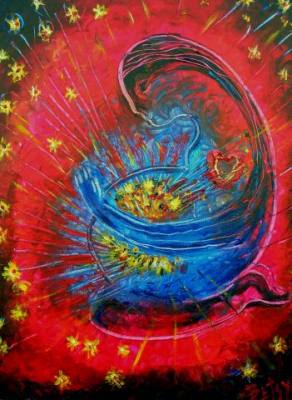A version of this blog post appeared during Holy Week, 2010. I hope you’ll find it useful as we use our worship Service this coming Sunday (April 1) to “Walk through Holy Week.”
 When I was a child, “Palm Sunday” was one of my favourite Sundays… children joined in the choir procession, we got to wave palm fronds (a decidedly romantic-exotic item in our Northern English parish), sing “Hosanna” at the top of our lungs. It was the one Sunday of the year where we kids were allowed to be heard as well as seen! I think the sense of forboding of Jesus’ entry into Jerusalem on the colt of a donkey, just a week before his execution, was lost on most of us under the age of 12. We truly were part of a jubilant crowd having no thought or concern for what would follow in the days ahead.
When I was a child, “Palm Sunday” was one of my favourite Sundays… children joined in the choir procession, we got to wave palm fronds (a decidedly romantic-exotic item in our Northern English parish), sing “Hosanna” at the top of our lungs. It was the one Sunday of the year where we kids were allowed to be heard as well as seen! I think the sense of forboding of Jesus’ entry into Jerusalem on the colt of a donkey, just a week before his execution, was lost on most of us under the age of 12. We truly were part of a jubilant crowd having no thought or concern for what would follow in the days ahead.
But, Palm Sunday in my childhood parish was also the beginning of a weeklong marathon of Church services:
- “Stations of the Cross” on Wednesday night, (a Roman Catholic tradition in which parishioners walk around the church and stop to meditate and pray at various “stations” – graphic depictions of the events leading from the Last Supper to the placing of Jesus’ body in the tomb).
- Thursday was “Maundy Thursday” with its bizarre ritual of footwashing. (“Maundy” from the latin “mandatum” meaning “command”, it’s a reference to Jesus telling the disciples (John 13:32) why he washed their feet, as a sign of the servant-love of Jesus, which we too must exercise: “A new commandment I give you; love one another”). You may want to check out the sermon for March 11, 2012 “It begins with a Towel” http://www.cedarparkunited.org/2012/03/12/march-11-2012/
- “Good Friday” – a day drenched in sadness. The Good Friday service was long, painfully so for a small kid, but nevertheless enthralling, graphic, tangible.
 While we read the version of the story from Luke in my home parish, Mark’s normal brevity is replaced by graphic bluntness in chapter 15. Mark even tells the time all the way through, “the third hour, the ninth sixth hour”… and so on. When Jesus’ last words on the cross were read (15:37), the church bell rang slowly, nine times. Not another word was spoken, but a series of actions took place which spoke volumes: the gold coloured altar cross was taken down and replaced with a very graphic ‘Crucifix’ complete with dying Jesus. The organist played Stabat Mater (an ancient hymn about Mary standing at the foot of the cross) while all the church banners were taken down, and women in the congregation covered all the statues (it was a Catholic church) with deep purple cloth. Even the baptismal font was emptied of its water, and draped in black cloth, something I found particularly sombre, full of forboding and dread. We filed out of the church in silence, an unspoken rule that no-one conducted church business or gossip on the steps on this day.
While we read the version of the story from Luke in my home parish, Mark’s normal brevity is replaced by graphic bluntness in chapter 15. Mark even tells the time all the way through, “the third hour, the ninth sixth hour”… and so on. When Jesus’ last words on the cross were read (15:37), the church bell rang slowly, nine times. Not another word was spoken, but a series of actions took place which spoke volumes: the gold coloured altar cross was taken down and replaced with a very graphic ‘Crucifix’ complete with dying Jesus. The organist played Stabat Mater (an ancient hymn about Mary standing at the foot of the cross) while all the church banners were taken down, and women in the congregation covered all the statues (it was a Catholic church) with deep purple cloth. Even the baptismal font was emptied of its water, and draped in black cloth, something I found particularly sombre, full of forboding and dread. We filed out of the church in silence, an unspoken rule that no-one conducted church business or gossip on the steps on this day.
- Good Friday was also a ‘day of fasting and abstinence’ in my tradition. We ate no meat, no treats, no dessert. We made (but did not eat) Hot Cross Buns, the cross symbolism self-evident, the spices symbolic of the spices used on Jesus’ dead body, the raisins symbolic of the blood he shed.
- Holy Saturday. Was a long, draggy day, brightened only by eating the Hot Cross buns for breakfast. (In our house, still no meat on Holy Saturday). Nothing happened that day until long after my normal bed-time, when we would be bundled back to church for the Easter Vigil, beginning at 10:30 pm, a service with lots of kneeling and silent prayer in a darkened church lit only by four small candles. …Then…… ( What happens next belongs to Easter Sunday, so you’ll have to wait til next week for that!!)
The drama of Palm Sunday and Holy Week was powerful, visceral, evocative, dramatic, ‘liminal’ (hovering on the edges of holy and ordinary), and it had a profound impact on my faith, not only as a child, but I suspect also as an adult. Although my understanding of God’s role in the ‘passion of Jesus’ has undergone transformation, it is still a story central to who we are as followers of “the Way” of Jesus Christ. I am grateful to have grown up in an era and in a tradition that ‘walked’ so graphically through Holy Week.
Perhaps all this liturgical drama was unnecessarily sombre? I’ve wondered, but I don’t think so. Life isn’t easy, while it has its measure of joy, delight, growth and wholeness, it is as full of chaos, malevolence, injustice, hurt and hatred, suffering, grief, loss, despair. This Gospel narrative of Jesus’ last week, is the story of the hard side of human living. Perhaps this is the hardest part of the Gospel, one that on our best days we wish wasn’t there at all, but it’s Gospel – “Good News” – for the worst days.
At Christmas we celebrated the birth of Jesus as this miracle of God-with-us. This week’s narrative tells us that God-With-Us will walk to the gates of Hell with us, will suffer injustice with us, will hurt physically, emotionally, spiritually, mentally with us. God-With-Us. No Matter What. It’s worth walking with God-With-Us, right through the palm-waving throng best days, right through the last meal and betrayal worst days, the dying days, the empty silent Saturdays, because when we do, we will, we most assuredly will, find ourselves on the threshhold of Easter…… but that’s next weeek!





![546229_384999778191553_192734606_n[1]](http://cpuc.edublogs.org/files/2013/08/546229_384999778191553_192734606_n1-1jp0atd.jpg)